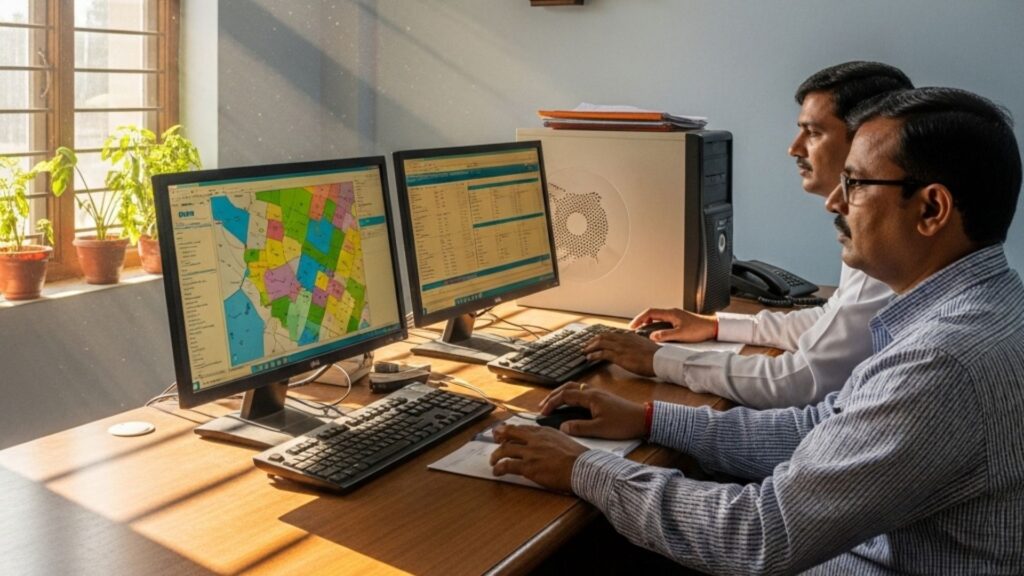In India’s real estate sector, land ownership and development approvals often face delays due to manual procedures and fragmented record-keeping. One of the most significant transformations taking place today is the digital governance of Gram Panchayat approvals. Traditionally, approvals from Gram Panchayats, especially in semi-urban and rural areas, were largely paper-based, slow, and prone to errors. However, with the adoption of digital platforms, these processes are becoming more transparent, efficient, and accessible.

Table of Contents
Why Gram Panchayat Approvals Matter in Real Estate
Gram Panchayats are the foundational level of governance in India’s villages and peri-urban regions. They play a crucial role in:
- Certifying land ownership records.
- Approving construction permissions.
- Issuing No Objection Certificates (NOCs).
- Validating land-use changes in compliance with local development plans.
For investors and developers, Gram Panchayat approvals form the legal basis for any property transaction. Without them, land deals risk disputes and potential legal complications. Hence, streamlining these approvals under digital governance has been a long-awaited reform.
The Push Towards Digital Governance
The Government of India, along with various state governments, has been actively digitizing land records through initiatives like Digital India Land Records Modernization Programme (DILRMP), SVAMITVA Scheme, and Bhoomi Portals in different states. Extending these reforms to Gram Panchayat-level approvals is the next step.
Digitization ensures that records are not just stored securely but are also made accessible to stakeholders through online platforms. This reduces dependency on manual registers and middlemen, who often delayed the process or created discrepancies.
Key Features of Digital Gram Panchayat Approvals
- Online Application Systems
Property owners and developers can now apply for approvals or NOCs through online portals. This eliminates repeated visits to Panchayat offices and cuts down paperwork. - E-Verification of Records
Land records, ownership details, and past approvals are verified digitally against state databases. This ensures consistency and reduces fraudulent claims. - Automated Status Tracking
Applicants can track the real-time status of their approval request, reducing uncertainty and enabling better project planning. - Integration with GIS Mapping
Many states are linking Gram Panchayat approvals with GIS (Geographic Information System) maps, ensuring land-use compliance and preventing unauthorized construction. - Digital Certificates and QR Codes
Approvals are issued as digitally signed certificates with QR codes, making them easy to verify for banks, developers, and buyers.
Benefits for Buyers and Developers
- Faster Transactions – What earlier took weeks or months can now be completed in a few days through digital workflows.
- Transparency and Trust – Online systems reduce human intervention, thereby cutting down opportunities for corruption or manipulation.
- Reduced Legal Disputes – Clear and accessible records lower the chances of overlapping claims or forged documents.
- Investor Confidence – With approvals traceable and verifiable, domestic and foreign investors are more willing to explore projects in peri-urban and rural belts.
- Financial Inclusion – Banks and lending institutions find it easier to provide loans against properties with digitally verifiable approvals.
Challenges in Implementation
While the shift to digital governance is promising, certain challenges remain:
- Digital Divide: In many villages, internet access and digital literacy are still limited.
- Data Accuracy: Legacy records may contain inconsistencies that need thorough verification before digitization.
- Capacity Building: Panchayat staff require training to operate new digital systems efficiently.
- Cybersecurity: Safeguarding sensitive land data from misuse or unauthorized access is critical.
These challenges are being addressed gradually through infrastructure development, training programs, and stronger data security frameworks.
Future of Digital Panchayat Approvals in Real Estate
As India progresses towards a fully digital governance model, Gram Panchayat approvals will play a central role in shaping transparent land markets. In the future, we can expect:
- Full integration of Gram Panchayat approvals with state RERA (Real Estate Regulatory Authority) systems.
- Blockchain-based land records for tamper-proof ownership verification.
- Mobile-first platforms that allow villagers and investors to process approvals directly from smartphones.
- Greater alignment with smart city initiatives, ensuring rural and peri-urban areas also benefit from urban planning standards.
Conclusion
The digitization of Gram Panchayat approvals is a landmark reform for India’s real estate sector. It not only accelerates property transactions but also fosters trust among buyers, developers, and financial institutions. For a country where land remains one of the most valuable assets, transparent governance at the grassroots level is a game-changer.
As these reforms mature, investors can look forward to smoother transactions and reduced risks when dealing with properties in semi-urban and rural regions. For developers, this opens a vast pool of opportunities for planned and legally compliant projects.
By bringing Gram Panchayat approvals under digital governance, India is laying the foundation for a more transparent, efficient, and future-ready real estate market.
Frequently Asked Questions
Q. Why are Gram Panchayat approvals important in real estate?
Gram Panchayat approvals validate land ownership, building permissions, and land-use changes, making them crucial for legal and dispute-free transactions.
Q. How does digital governance improve Gram Panchayat approvals?
Digital governance introduces online applications, e-verification, and real-time tracking, reducing delays, errors, and chances of corruption.
Q. Can buyers and developers directly apply for Gram Panchayat approvals online?
Yes, many states now offer portals where property owners, buyers, and developers can submit applications and receive digitally signed approvals.
Q. What challenges exist in digitizing Gram Panchayat approvals?
Key challenges include internet access gaps in villages, outdated records, training needs for staff, and ensuring strong cybersecurity measures.